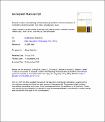Towards a better understanding of increased sleep duration in the chronic phase of moderate to severe traumatic brain injury : an actigraphy study
| dc.contributor.author | El-Khatib, Héjar | |
| dc.contributor.author | Arbour, Caroline | |
| dc.contributor.author | Sanchez, Erlan | |
| dc.contributor.author | Dumont, Marie | |
| dc.contributor.author | Duclos, Catherine | |
| dc.contributor.author | Blais, Hélène | |
| dc.contributor.author | Carrier, Julie | |
| dc.contributor.author | Gosselin, Nadia | |
| dc.date.accessioned | 2019-04-08T18:33:16Z | |
| dc.date.available | MONTHS_WITHHELD:12 | fr |
| dc.date.available | 2019-04-08T18:33:16Z | |
| dc.date.issued | 2018-11-28 | |
| dc.identifier.uri | http://hdl.handle.net/1866/21532 | |
| dc.publisher | Elsevier | fr |
| dc.subject | Actigraphy | fr |
| dc.subject | Sleep quality | fr |
| dc.subject | Sleepiness | fr |
| dc.subject | Fatigue | fr |
| dc.subject | Mood | fr |
| dc.subject | Medication | fr |
| dc.title | Towards a better understanding of increased sleep duration in the chronic phase of moderate to severe traumatic brain injury : an actigraphy study | fr |
| dc.type | Article | fr |
| dc.contributor.affiliation | Université de Montréal. Faculté des arts et des sciences. Département de psychologie | fr |
| dc.identifier.doi | 10.1016/j.sleep.2018.11.012 | |
| dcterms.abstract | Introduction Most adults with moderate to severe traumatic brain injury (TBI) report persistent sleep-wake disturbances. Whether these complaints are either associated with abnormal sleep-wake patterns or can be explained by TBI-related characteristics is unclear. The present study aimed at characterising the subjective and objective sleep-wake patterns in TBI adults by taking into consideration the influence of TBI severity, common comorbidities and psychoactive medication. Methods Overall, 34 adults with moderate-severe TBI (one to four years post-injury) were compared to 34 controls. Sleepiness, fatigue, sleep quality, mood, and pain were assessed with questionnaires. A seven day sleep diary and actigraphy was used to document sleep and wake patterns. Results Compared to controls, TBI participants reported more sleepiness and fatigue, as well as poorer sleep quality. On actigraphy, they had earlier bedtime and longer time spent in bed, but equivalent sleep efficiency during the nighttime episode compared to controls. TBI participants also took more naps and accumulated more time asleep over the 24 h period than controls. These group differences were accentuated when only TBI adults using psychoactive medication were included. More comorbidities, more severe injuries and longer hospital stay were positively correlated with fatigue, sleepiness and sleep duration. Conclusions Our results showed that despite complaints regarding sleep and diurnal functioning, TBI survivors have very marginal changes in their objective sleep-wake schedules. Prolonged time spent in bed may reflect an attempt to increase their sleep duration in response to fatigue and sleepiness. TBI adults who use psychoactive medication are those with more evident changes in their sleep-wake schedules. | fr |
| dcterms.isPartOf | urn:ISSN:1389-9457 | fr |
| dcterms.language | eng | fr |
| UdeM.ReferenceFournieParDeposant | doi: 10.1016/j.sleep.2018.11.012 PMID: 30578112 | fr |
| UdeM.VersionRioxx | Version acceptée / Accepted Manuscript | fr |
| oaire.citationTitle | Sleep medicine |
Files in this item
This item appears in the following Collection(s)
This document disseminated on Papyrus is the exclusive property of the copyright holders and is protected by the Copyright Act (R.S.C. 1985, c. C-42). It may be used for fair dealing and non-commercial purposes, for private study or research, criticism and review as provided by law. For any other use, written authorization from the copyright holders is required.


